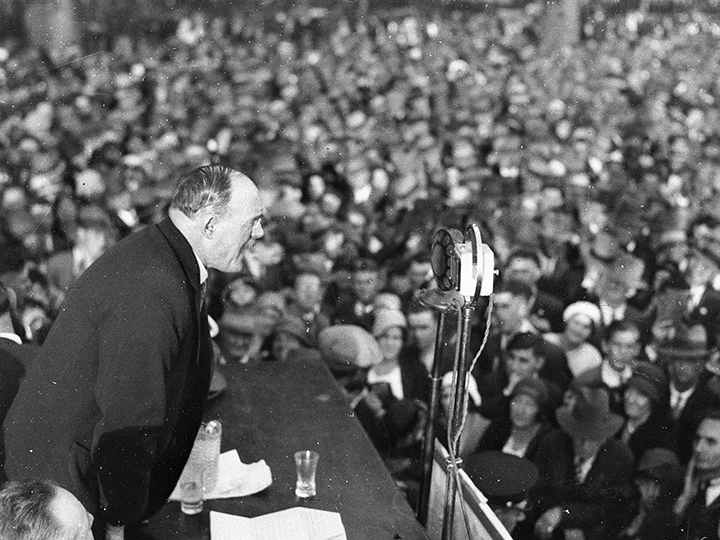In October 1929, the stock market crashed on Wall Street and the effects were felt around the world.
For Australia’s export-reliant economy, the blow was particularly hard. By 1932 Australian unemployment had reached 30 per cent.
Jack 'The Big Fella' Lang was premier of New South Wales during the worst years of the Great Depression. Lang disagreed with his state and federal counterparts over the approach to dealing with Australia's economic problems. The majority of the country's politicians advocated for economic austerity. Lang believed Australia needed to spend on public works and temporarily cease interest payments on loans from Britain to recover from the economic calamity facing the nation.
In 1930, unable to gain the upper house support he needed for his recovery program, Lang put forward two bills to amend the state's constitution and abolish the Legislative Council. Despite their controversial nature, the bills were passed by the council in the belief that a referendum would be required before they could become law.

In 1930, unable to gain the upper house support he needed for his recovery program, Lang put forward two bills to amend the state's constitution and abolish the Legislative Council.
Two members of the council, Arthur Trethowan (later Sir Arthur) and Thomas Playfair, stepped forward on behalf of other members of the council and the cabinet to ensure the bills were not given royal assent. Before the bills could be presented to the governor, the petitioners were granted an injunction preventing the president of the Legislative Council, Sir John Peden, from presenting the bills to the governor without a referendum. Allen Allen & Hemsley represented Trethowan and Playfair in all these proceedings and appeals.
On 23 December 1930, in Trethowan v Peden, the Supreme Court of New South Wales upheld the injunction and ordered that the government not present the bills until they had been ratified in a referendum. Lang's appeal to the High Court of Australia was dismissed in March 1931. A subsequent appeal to the Privy Council also failed in May 1932, just after Lang was dismissed by Governor Philip Game for defaulting on the British loans.
In 1933 Lang's successor, Premier Bertram Stevens, put forward a referendum through which he gained electoral approval to reform, but not abolish, the Legislative Council.
In 1959 Labor leader Robert Heffron was appointed premier of New South Wales and he immediately reinstated the party's policy to abolish the Legislative Council. Heffron's attempts to put forward a bill were challenged by opposition leader Hector Clayton. Allen Allen & Hemsley supported Clayton in Clayton v Heffron, but the Supreme Court found in favour of Heffron. In 1961 a referendum was held to determine the future of the Legislative Council – the proposal to abolish the council was rejected by the electorate.
